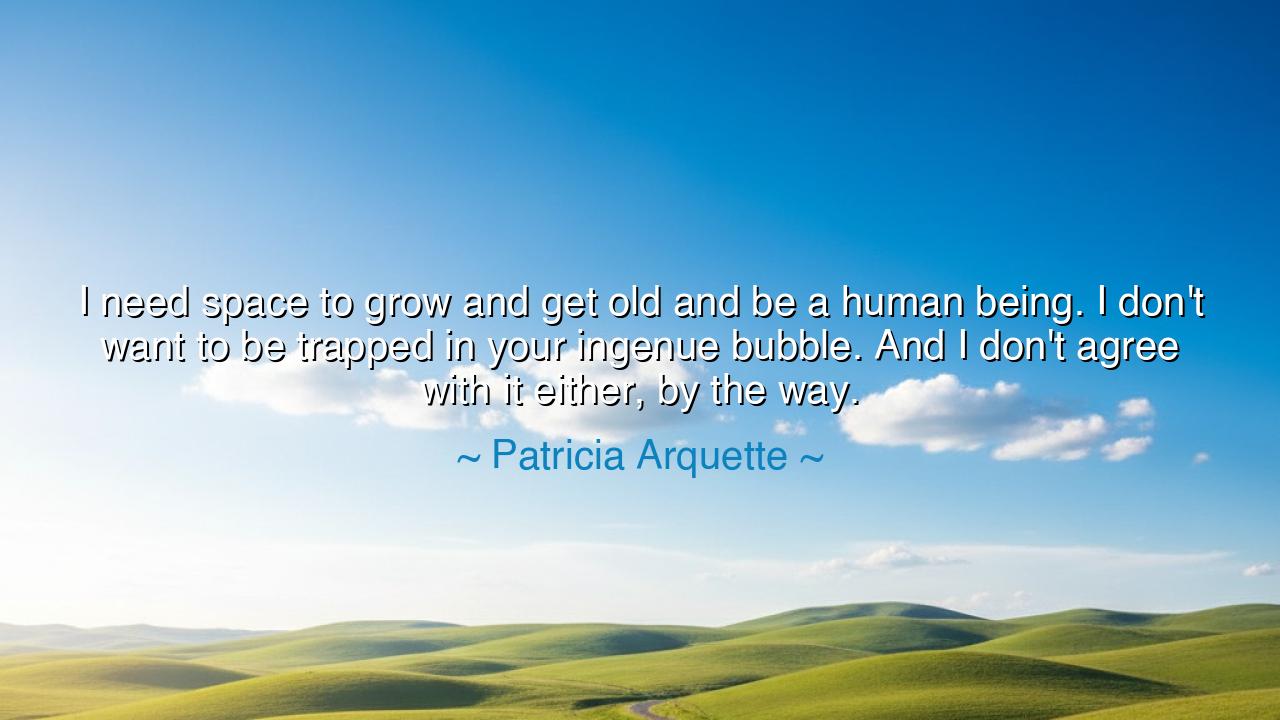
I need space to grow and get old and be a human being. I don't
I need space to grow and get old and be a human being. I don't want to be trapped in your ingenue bubble. And I don't agree with it either, by the way.






Hear, O seekers of truth, the words of Patricia Arquette: “I need space to grow and get old and be a human being. I don’t want to be trapped in your ingenue bubble. And I don’t agree with it either, by the way.” These are not the idle words of complaint, but a cry for dignity, a defiance against the prison of illusion that society weaves around women. In them we hear the age-old struggle of the soul yearning to be seen not as an ornament, not as a fleeting flame of youth, but as a whole being—free to age, to change, to live fully without being diminished.
The meaning is profound: to demand space to grow is to demand the right to unfold naturally, like a tree stretching toward the sun. Too often, women—especially in the realm of art and beauty—are confined to the role of the ingenue, the eternal maiden, youthful, innocent, and desirable. But this role, though adorned in praise, is a cage. It denies women the right to transform, to gather the richness of time, to wear the crown of years with pride. Arquette refuses this cage, declaring that her humanity is greater than any role imposed upon her.
This struggle is ancient. In Athens, the dramatists wrote few roles for women, and often men played them in masks, stripping real women of their voices. Centuries later, in Shakespeare’s England, actresses were still forbidden from the stage. Even when at last women were permitted to act, they were confined to the ingenue bubble—maidens, lovers, temptresses, rarely mothers or wise elders. Society has long feared the sight of women growing old freely, for in their maturity lies wisdom, authority, and a power that cannot be controlled by simple desire.
Consider the life of Eleanor Roosevelt. She was not admired for youthful beauty, but for a deeper strength. She entered public life not as an ornament but as a force: a champion of the poor, a warrior for human rights. Had she been confined to the bubble of expectations placed upon women of her time, her light might have been dimmed. Yet she claimed her space to grow, embracing the fullness of her humanity, and by doing so, she transformed the role of First Lady into a platform for justice. Her life proves Arquette’s truth: women must be allowed to expand beyond the narrow definitions imposed upon them.
Arquette’s defiance also carries warning. To accept the ingenue bubble is to deny one’s own humanity. For all people—men and women alike—must pass through the seasons of life. To resist this passage is to live in illusion, clinging to masks that crack with time. True dignity lies not in denying age, but in embracing it as a crown of growth. To reject the natural journey of the self is to live half a life.
The lesson for us, O listener, is to honor the fullness of humanity in yourself and in others. Do not confine women, or men, to narrow roles built only on youth, beauty, or strength. Celebrate the growth that comes with time—the deepening of wisdom, the resilience of spirit, the power of transformation. And in your own life, resist the cages others would build around you. Claim your space—to learn, to change, to falter, to rise again.
Therefore, take action: speak truth when others try to limit you to what you once were. Refuse the bubble of false expectations. Stand firm in your right to be a whole and evolving being. Give the same gift to others, honoring them not for how they fit into roles but for who they truly are. In this way, you will live not in confinement but in freedom, not as a mask but as a soul radiant with the fullness of life.






AAdministratorAdministrator
Welcome, honored guests. Please leave a comment, we will respond soon